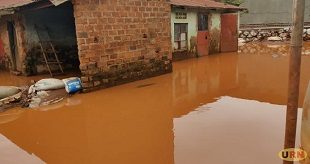
Lamwo, Uganda | THE INDEPENDENT | South Sudanese refugees in Lamwo district are being blamed by the host community for destroying trees planted on individual land for fuel.
Willington Apata, a resident of Padwat Central village in Padwat parish, Palabek Ogili sub-county told Uganda Radio Network that on Monday this week, he found 65 of his teak trees cut down by the refugees and the covers of five of his modern beehives yet to be colonized, removed.
Apata suspects that the refugees are using part of the beehives to make doors or windows.
Apata, who planted his teak tree on a three-acre piece of land in 2011 believes that by now, he can get Shillings 15,000 from each and more money when the trees reach full maturity in 10 more years. Apata, whose woodlot is about four kilometers away from Palabek Settlement, explains that the refugees have destroyed most of the natural trees near the settlement and are now moving kilometers away to destroy people’s woodlots.
He expressed frustration that five of his beehives were also harvested, yet he could get between Shillings 300,000 to 500,000 every season after harvesting honey.
Apata revealed that two other beekeepers in his neighborhood also found some of their uncolonized beehives dismantled. He said farmers have been complaining of the problem since 2021, adding that they always meet the refugees in their woodlots in the morning and they become wild especially when they are many.
Apata said he reported the matter to Palabek Ogili police post on Tuesday, but they advised him that his case will be best pursued once a suspect has been nabbed.
Oswin Oguti, the Lamwo Deputy Resident District Commissioner acknowledged receiving several complaints about the refugees destroying people’s woodlots, saying they were already in talks with officials from the Office of the Prime Minister, to ensure that the matter is handled.
Oguti said they also plan to meet the zonal leaders of the refugees and sensitize the refugees on the dangers of destroying the trees both on the environment, as well as the relationship between them and their hosts.
Attempts to get a comment from Titus Jogo, the Refugee Desk Officer for Lamwo and Adjumani districts failed as he canceled his calls. Uganda is home to 1.49 million refugees, which is causing a strain on the land, food, and resources.
According to a January 2023 report by UNHCR, there is a need for US$ 128.5 million to fund priority areas in the first quarter of 2023 else, services will be reduced and operation cuts introduced, causing severe implications such as continued deforestation in and around settlements.
“The provision of household cooking energy for 14,400 households will be deprioritized, and 1,600 hectares of woodlots for firewood will not be re-planted. In addition, three million trees will no longer be planted annually to mitigate the impact of refugee use of firewood,” the report reads in part.
“De-prioritization of fuel for cooking among 75,000 refugee households will escalate the deforestation of at least 2,000 hectares of woodlots, which are being destroyed for firewood, yet not being maintained,” the report adds.
It is predicted that the effect of increased depletion of the trees will expose girls and women to protection risks during firewood collection and damage relations between the host communities and refugees.
According to information from UNHCR, there were 69,392 refugees in Lamwo district by 31st December 2022, broken down into 15,510 households.
*****
URN
 The Independent Uganda: You get the Truth we Pay the Price
The Independent Uganda: You get the Truth we Pay the Price



